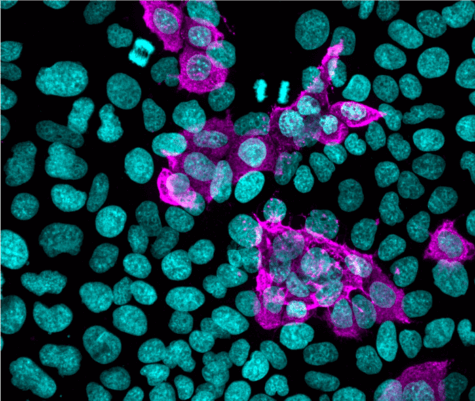
PHILADELPHIA — The key to ending the pandemic may have been sitting in the dairy aisle this entire time. Researchers from the University of Michigan and Glanbia PLC Research and Development report a cow milk protein inhibited SARS-CoV-2 (the virus that causes COVID-19 infection).
Lactoferrin is a protein found in the milk of most mammals. In this study, bovine lactoferrin — a protein in cow’s milk — was studied for its unique features with “bioactive characteristics” that appear to work against many microbes, viruses, and other pathogens. In a controlled, experimental environment, lactoferrin stopped SARS-CoV-2 infection by impeding the coronavirus’s ability to enter and infect target cells. The cow milk protein also helped prop up cells’ antiviral defense mechanisms.
“Bovine lactoferrin has shown antiviral activity in human clinical trials,” says lead investigator Jonathan Sexton, PhD, of the University of Michigan Department of Internal Medicine, in a press release. “For example, orally administered bovine lactoferrin has been shown to improve the severity of viral infections, including rotavirus and norovirus. Given the broad antiviral efficacy and safety, minimal side effects, and commercial availability of bovine lactoferrin, several review papers have suggested using it as a preventive or post-exposure treatment for SARS-CoV-2 infection.”

Strong antiviral effects against all COVID variants
Study authors tested bovine lactoferrin against various SARS-CoV-2 strains, such as the WA1 variant, which caused the first U.S. COVID-19 wave in 2020.
“Each of these variants includes modifications to the SARS-CoV-2 spike protein that reduce the efficacy of newly produced vaccines. Furthermore, each of these strains shows reduced neutralization by vaccination sera,” Dr. Sexton adds.
Initially, the research team conducted this work with a few main goals in mind. The first was to build on earlier observations that bovine lactoferrin could have antiviral effects. The second was to see which milk products contain ingredients that could influence or enhance lactoferrin. Finally, the study authors also considered the possibility that dextrose and sorbitol may block bovine lactoferrin’s COVID-fighting abilities. Dextrose and sorbitol are common ingredients in making oral medication tablets.
Remarkably, bovine lactoferrin was effective against all tested strains of SARS-CoV-2. Based on the findings, the team predicts bovine lactoferrin could offer the same anti-viral benefits against future SARS-CoV-2 strains. Other ingredients in commercial milk products did not provide any anti-viral benefits.
Dextrose and sorbitol did not stop any bovine lactoferrin’s anti-viral properties. The results suggest cow’s milk could help create an anti-COVID pill in the future.
Cow milk protein could treat future infectious diseases
Looking more broadly, bovine lactoferrin’s antiviral effects show promise in preventing or treating other infectious diseases beyond SARS-CoV-2.
“This is especially important when there are limited treatment options, or when the treatment options are too costly for widespread use. An orally available therapeutic that covers emerging strains would be ideal for treating SARS-CoV-2 in areas without widespread vaccination or if new strains escape the vaccine,” Dr. Sexton concludes.
The study is available to read in the Journal of Dairy Science.
